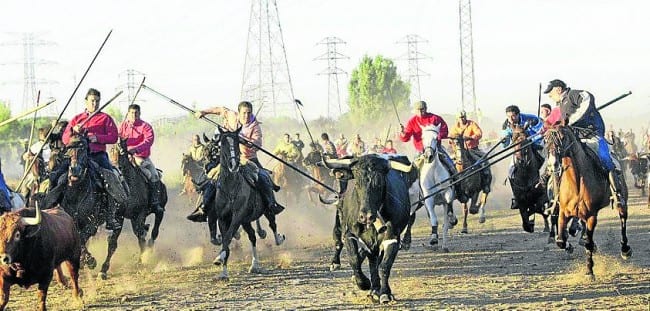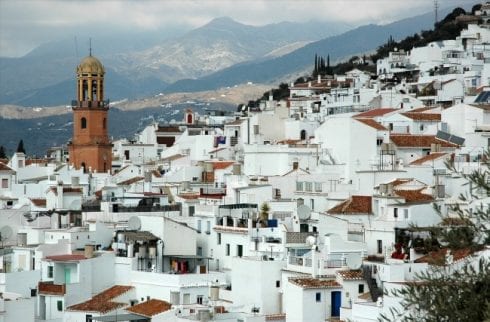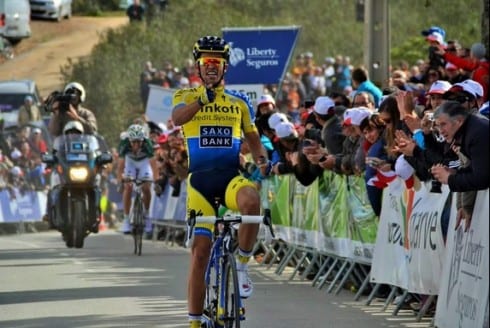
THERE are around 3,000 fiestas in Spain which revel in the torture of living creatures.
Whether it’s donkeys being dragged around streets by drunkards, turkeys lobbed out of church towers or rats hurled across a Valencian plaza, it’s not exactly hard to see why this country has a shocking record for animal welfare.
And the south, particularly Andalucia, is perhaps the worst culprit.
But on the morning of January 20, 2016, a man called Antonio Moreno got on his bike and began pedaling. It wasn’t exactly Neil Armstrong and the moon, but it was momentous in a more subtle way.
Every day at 10:30, Moreno, from the Axarquia, holds a talk on animal rights issues in whichever city, town or village he finds himself, while also collecting donations for local animal shelters.
He expects to be ‘on the road’ for at least two years.
Moreno is the president of the Andalucian Group Against the Mistreatment of Animals. The mere existence of this group shows that at least some of the country is looking for change, but there is a long journey ahead.

Thankfully the work has begun, with the support that animal rights party PACMA is building at both local and national level.
Evidence of this is the 220,000 votes the party received nationwide at last May’s general election and while it was not enough to gain the party an MP its strength is harnessing nicely.
These days, for example, there is hardly a single animal-harming festival where you won’t find a group of PACMA protesters filming the events and publicising them to the world.
With the increasing expansion of 24-hour online global news and the need for constantly new material, the likes of the Daily Mail cannot get enough.
Take the recent rat-throwing festival in Valencia. The footage was hard to stomach for most of us, but the baying crowd flinging dead rats by their tails at each other showed no signs of letting up… and all of it seen in glorious technicolour in the Mail’s infamous – and perhaps appropriately named – ‘column of shame’.
Another example is September’s Toro de la Vega festival, in Castilla y Leon, in which a bull is speared by men chasing it on horseback, determined to claim their ‘honour kill’.
Pictures are now beamed around the world, leading to global outrage. But it is not just abroad.
Last year, an estimated 10,000 animal rights protesters marched through Madrid in protest; yet it still went ahead.

Elsewhere, at Peropalo feria in Extremadura a donkey is ridden through narrow streets by a drunk man while the crowd fire shotguns and bang drums.
The same donkey, Felipe, was used for five years in a row until the Antequera-based charity Refugio de Burritos was granted permission to rescue him in 2015.
He was in a terrible state suffering from laminitis, a disease that causes pain to walk.
The Refugio offered to pay for a wooden donkey for this year’s festival but this was declined in favour of another donkey.
But there are signs of hope.
Thanks to pressure from PACMA last month, a Jaen village agreed to ditch its tradition of throwing a turkey out of its church belltower, instead electing to carry it around the village.
A large chunk of the Refugio’s donation comes from expats, and it is obvious that Spain’s ever-growing foreign population can play an important role in animal welfare.
And there have already been a number of success stories brought about by expats.
Take Casares, which has recently banned animal circuses off the back of a petition launched by Brit Angela Ferguson. Or in Mijas, where activist Michael Owens recently spearheaded a successful campaign to get pony carousels banned by the town hall.
Meanwhile, expats such as Pat Waterhouse, who looks after more than 50 abandoned dogs at her home in Alora, and Jacqui Ross, who runs Last Chance Animal Rescue, set shining examples.
Then there are all those hard-working volunteers at shelters like Adana, in Estepona, Horse in need, in La Linea, and the Axarquia Animal Rescue Centre, to name but a few.

And don’t dismiss the power of the internet. This time last year, photos emerged of a man tying his dogs behind his car and driving around a town in Sevilla province.
They quickly went viral on social networks and a petition signed by more than 70,000 people was presented to the authorities. The next day, the Guardia Civil dropped by to inspect the dogs.
“There is a really long way to go for animal rights in Spain,” says Maria Gallar, of the Refugio de Burritos.
But at least we are now heading in the right direction.
Every day, the wheels turn on Antonio Moreno’s bike as Spain too gradually pedals its way towards an animal rights revolution.
Perhaps, one day, he won’t need to pedal anymore.
The Olive Press will be publishing a number of animal rights related stories in the coming days.
Click here to read more News from The Olive Press.









Having lived here in Spain for 2 years from the UK I have to say in general how I see the animals treated here disgusts me, and my neighbours all look at me strangely when I say I am taking my cat to the vet or the fact my cats and dog live int he house with me
Popular Spanish disregard for animal rights is rooted in Roman Catholic teachings, though the present pope’s position is likely more enlightened given his namesake of Francis (de Assisi).
A version of the Catholic position is shown here (“http://www.catholic.com”):
“Since animals and plants are living things, they have souls, but not in the sense in which human beings have souls. Our souls are rational–theirs aren’t–and ours are rational because they’re spiritual, not material. Although some animals seem clever, they don’t actually possess conceptional intelligence. They can’t, for instance, conceive of the abstract notion of justice.
Animals and plants also lack a moral sense. When you scold Spot for chewing the carpet and tell him what he did was “wrong,” you aren’t assigning guilt of sin to him, since he can’t commit a sin.”
But animal researchers and home owners know that dogs and other non-human animals do express guilt (e.g.,Cesar Millán).
Ethologists, evolutionary biologists, neuro-cognitive researchers and pet owners know that animals are capable of extraordinary cognitive and moral acts. And these activities are not reducible to obsolete behavorist notions. They are part and parcel of being alive in the world.
Do animals necessarily have the ‘capacity’ to draw silly formalist conclusions from theorems of orthodox religious zealots? Mercifully, not likely.
The Catholic web site continues:
“Human souls, by contrast (to animal souls), aren’t material. They’re spiritual. Only a spirit can know and love, a spirit’s two chief faculties being the intellect (which knows) and the will (which loves). We know human souls are spiritual since humans can know and love.”
This is both historically, scientifically and logically false. Clearly, animals demonstrate love, even self-sacrifice. ‘Soul’ refers in English to the word ‘de anima’, and denotes the life-giving forces of all animals, and demonstrates more than merely than ‘material’ existence for non-humans (see Aristotle, ‘de Anima’; Aquinas, ‘Commentary of de Anima’).
And sensitive experience shows that animals do develop brain potential for actions that go beyond many human actions – as exemplified by some humans’ disregard of animals’ spiritual rights.
“Cats and dogs are loyal friends to humans. A ban on eating them would show China has reached a new level of civilization,” said Professor Chang Jiwen of the Chinese Academy of the Social Sciences, one of the China’s top campaigners for a proposed law banning human sale and consumption of cats and dogs. (CNN, Connect the World, March 9, 2010)
Human souls – where exactly do you find them, which part of the body should I dissect? Is this ‘soul’ in the brain, the heart, where?
If all the religious and political freaks were rounded up and processed into useful material the world would be a far better place for all life forms.
Scientific inquiry in neurophysiology has gone far beyond the late 19th C- early 20th C materialist, reductionist paradigms. The notion that the brain is the computer-like central processor has largely been rejected in favor of complexity theory approaches. Complex neural activity is networked throughout the body making living processes one with environment.
Are you serious!!! Spaniards are notorious for abusing animals. They leave their hunting dogs tied to trees if they break a leg on a hunt. They abandon animals all over the place. Religion has absolutely nothing to do with how you treat an animal. It is just plain downright common decency. If you abuse and animal does not say much about you as a person, does it?
Contrary to old Roman Catholic teachings, animals are not some deity’s gift for chosen people to exploit. When indifference or disregard to life dominates a culture’s fabric, the culture needs huge educational efforts to fix. Animals have ‘moral, social and intellectual’ capacities because they have complex nervous systems (CNS) similar to humans. Popular Roman Catholic ignorance denies these capacities.
Animal abusers (such as my village neighbors) say:”Ahh, that’s nothing, its only an animal.” But its the people who do not know any better: they need to be taught. And that’s difficult because of the problem’s depth and breadth.
Finally, animal abuse is also traceable to alcoholism and child abuse,two other serious social problems calling for change.